Kategorie: ‘Host Country’
My experiences in Oslo
- Molecular and Applied Biotechnology (MA)
- Norway, Oslo
- University of Oslo (UiO)
- 01/10–30/11/2022
I completed a two-month research internship at the Department of Biomaterials of the University of Oslo (UiO). In the following, I would like to tell you about my experiences before and during my stay.
Finding an internship and an accommodation
Although my home university, RWTH Aachen University, does not have an Erasmus partnership with UiO, I came into contact with the institute through my student assistant supervisor, who completed his Bachelor’s thesis there. After a lot of back and forth about the date and topic of the internship, writing a project plan and applying for accreditation of the internship at my home university, the big challenge of finding a place to live began. Unfortunately, my application for student accommodation with SiO, the student organisation in Oslo, was rejected – probably because of my short period of stay – and I had to look for accommodation on the private market. I sent many requests on finn.no and hybel.no, most of which I didn’t even get an answer to, but in the end I had found a room in a 2-person shared flat and nothing stood in the way of my internship. To get there, I decided to go green and first took the train to Copenhagen, where I had a one-day stopover, and then continued by Flixbus through Sweden to Oslo.
The internship and my working environment
My workplace was the Department of Biomaterials at the Institute of Clinical Dentistry, which is part of the University of Oslo. It was essentially a research laboratory of the dental clinic, and most of the research conducted there had to do with dental implants in the broadest sense. I was warmly welcomed and integrated into the team from day one. We were an international research group with a few Norwegians and many scientists from all over the world. Apart from me, there were two other interns, a German and an Italian, and both were Master’s students just like me.
Compared to my experiences in Germany, the hierarchies at our institute were quite low and hardly noticeable, and social interaction was very important: Not only did we have lunch together every day, but we also had many nice conversations, especially on the days when someone had brought a cake or something typical from their home country after visiting or receiving visitors. Sometimes we also organised social events – for example, an international lunch on United Nations Day on 24 October: Everyone was assigned a country from which they had to cook and bring something typical. My country was Tanzania and I made vitumbua (coconut rice pancakes), a popular street food. Before Christmas, socialising became even more important, so on the last day of my internship, I sat in the lunch room with my supervisor, my professor and some other colleagues and folded paper Christmas stars while eating homemade gingerbread.
Although the working atmosphere was quite relaxed, we not only took breaks and drank coffee (which, by the way, was free for all employees, including interns), but also worked in the lab and were very productive in conducting experiments. My project was about validating a method to study cell adhesion to different surfaces. Since my internship was comparatively short, I already started to conduct my experiments independently after a one-week introduction. I had quite a tough schedule and on some days I had to give up my lunch break for the sake of the experiments, but my colleagues always supported and motivated me, so I was able to overlook this and very much enjoyed going to work. In the end, I had a lot of useful results that hopefully contribute to the progress of research on this topic. However, I did not only work on my project alone, but was also part of a project group in which my internship project was embedded. We had weekly meetings and one week we even had a two-day meeting with partners from other countries, where we shared results of previous research as well as ideas about future research tasks and planned the next steps. Of course, social events were also part of it, and so it happened that we not only played minigolf together, but they also took me to a fine dining restaurant, which was the first time in my life.
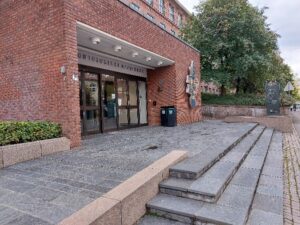 Entrance of the Institute of Clinical Dentistry © Friederike Götz
|
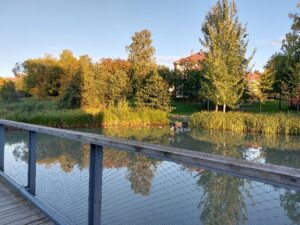 Pond right next to my flat © Friederike Götz |
Financial considerations
The cost of living in Oslo, as in all of Scandinavia, is quite high. My room rental was only two-thirds covered by the Erasmus+ funding, and the costs for daily needs such as food had to be paid on top of this, of course. At first I was a bit shocked by the prices in the supermarkets, which were sometimes twice (or even more) as high as in Germany. I didn’t go to restaurants often, which would have been even more expensive, and I didn’t buy alcohol – thanks to the high taxes on alcohol (and sugar) in Norway. But I have also found some ways to save money in everyday life: In the supermarkets, “Tilbud” is the word that indicates special offers. The weekly offers are often already sold out at the beginning of the week, but if you have the opportunity, it is worth taking it and getting groceries as well as cosmetics and other products much cheaper. Another insider tip is Grønland Frukt Og Grønt (located in Smalgangen 2), a shop where you can buy fruit and vegetables, but also spices and other foodstuffs at reasonable prices.
Free time in Oslo
At the beginning of the internship, the weather was still quite nice and I often explored the city after work and at the weekends. I had a student travel ticket that allowed me to drive all around the city and explore the city centre, the many parks, the harbour and lots of other sights. Since I love sports and play tennis in Germany, I didn’t want to give it up in Oslo either. There was a Facebook group to find tennis partners – which I made use of. Since the court rental was quite expensive, I often played in the morning before work, because then the prices – especially for students – were considerably cheaper. Although my institute had a small gym that I could use, I signed up for SiO Athletica, the student organisation gym that has several locations all over the city. I participated in some courses and on Sundays sometimes in walks that started in Kringsjå, the part of Oslo where the largest student housing is located. There is a beautiful lake there called Sognsvann with many hiking trails around it.
As my internship progressed, the days became noticeably shorter and the weather no longer invited me to spend too much time outside. These times were perfect for sauna visits. Together with some colleagues and friends, I booked a private group sauna that swam in the Oslo Fjord, with a beautiful view of the opera and the possibility to jump into the fjord if it got too hot inside.
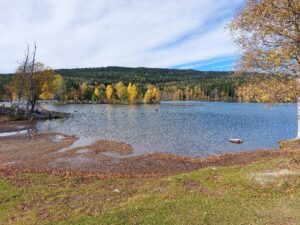
Sognsvann © Friederike Götz
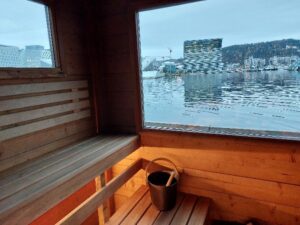
Sauna in the Oslo Fjord © Friederike Götz
Our weekend trip to the Nærøyfjord
One weekend, I went on a trip to the fjord scenery of Norway together with some of my internship colleagues. We rented a car (which was more difficult than expected, as we needed either a credit card or a Norwegian bank account, which neither of us had) and drove almost 8 hours to Voss, a municipality near Bergen. The drive took longer than expected because there was heavy rain that day and several times we came to places where a Norwegian stood next to a car with hazard lights on in the dark in the rain and told us that the road was closed and we had to take another route. In the end, we arrived at our accommodation right on the lake – which was now more or less in the lake, as our basement was flooded. Fortunately, the water had not damaged much and the upper floors were enough for us to sleep. So we were able to enjoy our weekend including an acquaintance with the unpredictable strength of Norwegian nature and a ferry trip on the Nærøyfjord, one of the two UNESCO fjords in Norway. The ferry went from Gudvangen to Flåm, a village famous for its railway, and was pleasantly empty as we were there outside the main season. Although the weather was not the nicest, the view was fantastic and I took many impressive photos that will always remind me of this unique experience.
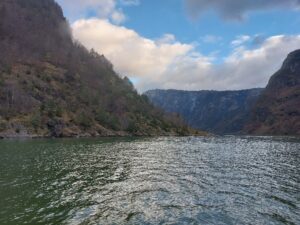
On the ferry in the Nærøyfjord ©Friederike Götz

View of the lake at our accommodation in Voss © Friederike Götz

View of the Nærøyfjord from Stegastein viewpoint © Friederike Götz

Waterfall in Nærøyfjord © Friederike Götz
My experiences in Sweden – enriching on a professional and personal level
- Construction and Robotics M.Sc.
- Gothenburg, Sweden
- Volvo Group
- March 2022 – December 2022
My decision to seek out an internship abroad was motivated primarily by the opportunity for professional growth. I was motivated to join my host institution- Volvo group in the department of Volvo trucks, for digital and flexible manufacturing plant, for several reasons: Firstly, it is a completely international organization, bringing together diverse collaborations between researchers from all over the world. I was very excited to gain diverse, international, and interdisciplinary perspectives on manufacturing and computer vision as I believed this could offer me a new kind of comprehension of global opportunities. I was also looking forward to building connections with colleagues from my host institute and experiencing first-hand how they approached their work and how their daily working life looked like. Secondly, the fact that the institute was in Gothenburg, Sweden appealed to me as I felt that the new context could offer me unique insights into the research field of Digital productions in real scale industry.
On a personal level, I also believed doing my internship abroad could provide me with the challenge and room for growth offered by new and different surroundings and the opportunity to meet new people. I knew Gothenburg has a beautiful historical center and I was excited to explore the architecture and history of the city. After several months of lockdown due to the Covid-19 pandemic, I found the prospect of new experiences especially energizing and fulfilling.
During my internship I was entrusted with a research project on Computer vison for overhead cameras and AGVs and received the opportunity to work as a researcher with doctorate students and professors from Chalmers University, Gothenburg. Research projects provided me with extremely enriching and fulfilling experiences, in which I learned even more than I could have imagined.
Within the scope of the multiple projects, I explored different methodologies to be able to quantify effectiveness of ARTags- Apriltags, ArucoTags considering light effects, occlusions, speed of detection and tracking. This entailed discussing the advantages and disadvantages of each tags with my team members, critically reviewing and presenting about previous research and learning to practically apply the methods. I worked on strategies for image fusion from multiple cameras and segmentation models as well as computer vision for distributed systems.
Besides cultivating fundamental research competencies, I also developed various soft skills. I cultivated professional and communication skills by interacting with colleagues on a daily basis and working closely together with team members. In doing so, I learned a great amount from my colleagues and their experiences. I both received the opportunity to hold presentations but could also attend lectures given by my colleagues to directly learn from them how to communicate ideas and research findings in an optimized way. I also learned when it was important to ask for help from others and became more confident in taking initiative and contributing my own ideas to the project. By juggling between different tasks and projects, I was able to improve my time management skills and set priorities to become more organized. This also helped me to optimize my work efficiency but also recognize my limits and learn to communicate if I wouldn’t be able to finish a task in the allotted time.
I very much appreciate the large amount of support I received from my host IAESTE and Volvo. I met with my supervisors at least twice a week, sometimes even more frequently and they took a lot of time to guide me and integrate me into the working group as much as possible. My supervisor also often asked me for my opinion and my ideas, which I cannot thank her enough for. Being able to voice my own thoughts and viewpoints proved to be an invaluable opportunity to self-sufficient and independent creative thinking.
Finding accommodation in Gothenburg was most likely one of the most difficult parts of my stay abroad. It was very difficult to find an apartment through online websites from Germany – most of them were in Swedish, many proved to be scams and non-existent and the rest were very expensive. My host institute and IAESTE Gothenburg helped me. My advice would be to start searching for accommodation as early as possible and ask for help from others who are living there.
All of my colleagues at the Volvo trucks are very welcoming and friendly, allowing me to feel completely included and happy during my time there. I gained the opportunity to meet and spend time with many new people. I learned a great amount from them and cherish the memories I have with them. I did get the chance to meet many local people outside of my internship and I was still able to explore a large amount of the city life and surrounding areas with my colleagues, which made me feel more connected to the place I was living in.
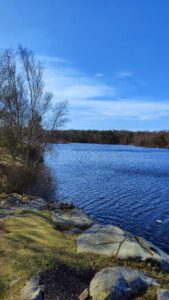
© Gaurav Makwana
In my free time, I would meet with friends from my work and explore the city. I enjoyed going on bike and scooter rides, exploring islands, visiting different historical sites, going to local cafes and restaurants to enjoy FIKA culture, finding the tastiest croissants and travelling to nearby cities or villages. Gothenburg is also close to the sea so I would strongly recommend to head down to all islands and go hiking and swimming there in some of the bluest cold waters you can find. I found the public transport system in Sweden to be very useful for short trips and affordable.
The living costs were in my experience higher in Gothenburg, as compared to Germany. I am therefore very grateful to Erasmus+ for giving me the opportunity to pursue an internship abroad and financially supporting me.
I attended an intercultural seminar and found this to be very helpful to get into a mindset that allows you to make the most out of your time abroad. It also teaches you that any difficulty or hardship that you face in the process can be a valuable learning opportunity. For these reasons, I would recommend it to other students, especially those who have never been abroad before or are looking to gain new insights and perspectives onto their upcoming journey.
My studies and previous research experiences provided me with foundational tools and background knowledge that I could draw from throughout my internship. By being able to apply these skills and competencies, I was able to strengthen and build on to them. This allowed me to cultivate essential research skills and grow confidence in putting them to practice.
Due to the rewarding and fulfilling experience I had during my internship, I feel highly motivated to pursue my studies and to maximize the insights I gain from my courses and professors. The experience also incentivized a future career in Computer vision and Digital manufacturing. Through my internship I realized how important it is to approach a digitalization topic from different angles and perspectives in order to fully understand it and to be able to implement efficient and safety policy measures aiming to mitigate the problems. This taught me how diverse the field can be and how important it is to think creatively and maintain an open mindset for learning from others, regardless of the stage you are in in your career. This reinforced and strengthened my motivation for pursuing a career in global Digitalization strategies.
In summary, while my expectations that I would learn a great amount about the field of Computer vision and develop professionally were fulfilled, my experience abroad also turned out to be very enriching on a personal level – far more than I had anticipated. During my time in Gothenburg, the new people I met, the unique and historical surroundings of the city and the positive and challenging experiences I was confronted with paved the way for growth and self-development. It also made me more open and adaptable to setbacks and helped shift my perspectives to ones in which I could more easily cope with and learn from mistakes.
I believe challenges during an experience abroad are inevitable but that they ultimately prove to be valuable learning opportunities. As eliminating them is not an option: to reduce problems, I believe it is important to plan as much as possible. In my opinion, however, it is more important to anticipate that unexpected outcomes, both good and bad, are bound to come your way and that the way you deal with them will shape your experience.
If you receive the opportunity to do an internship at the firm like Volvo for Research, I would highly recommend to grab the chance. Volvo for Research is a very open-minded and welcoming institution, tailored towards international cooperation. It is a place that fosters growth and openness. I am very thankful that I was able to spend my ten month internship there and would like to express my sincere gratitude to my supervisor and colleagues at the Volvo trucks, as well as to those at RWTH Aachen supporting the Erasmus+ traineeships abroad.
Writing my master’s thesis in California
- Environmental Engineering M.Sc.
- Berkeley, California, United States of America
- Lawrence Berkeley National Laboratory
- January 2022 – August 2022
My stay abroad at the Lawrence Berkeley National Laboratory (California) was 8 months long, from January 2022 to August 2022. During this time, I was doing research for my master’s thesis (Process Engineering) and did not collect any CPs as a student at UC Berkeley.
Preparations:
I started contacting professors from UC Berkeley, asking for an opportunity to research on my master’s thesis without having a concrete topic. Through several emails and zoom meetings I was invited as a “visiting student researcher” at the Lawrence Berkeley National Laboratory (LBNL), the equivalent to the “Frauenhofer Institut” in Germany. I had to apply for a J1 Exchange Student Visa, which meant filling out many documents and a lot of planning. In total, this process (called Free Mover) took almost a year before I was able to fly to San Francisco International Airport to start my research beginning of January 2022.
Living:
I found a shared apartment via craigslist close to my work and close to the campus. Do not underestimate the costs of living in the Bay area. For my room in a normal sized apartment with three housemates and a garden I paid $950. Food is as well a big expense, for example, a loaf bread costs $9 compared to a German 3€ loaf. Expensive is as well eating out (Pizza $15 compared to 5€) or having drinks (Beer $10 compared to 3€). But the food scene in Berkeley/Oakland/San Francisco is very versatile and vibrant, which surprised me. This all-year-great weather leads to people being active and sociable no matter how expensive life is.
Culture:
Near Berkeley is Oakland, a larger city that has become very attractive to the middle class. In Oakland, you can witness the process of gentrification, which means that the wealthy young generation is taking over an entire neighborhood from the poorer population. Oakland has a vibrant, fascinating culture on one side and crime and poverty on the other. To the west of Berkeley is San Francisco, which can be reached in about 20 minutes by BART, the local subway (cost $5, use ClipperCard). Berkeley is rather a quiet
University town, whereas SF is a magnet for tourists. The best places in SF are the Golden Gate Park (in the center of the city), the Dolores Park (a very crowded park, full of locals), Chinatown and Ocean Beach, there are as well great bars and festivals all year round. North of SF you can go hiking along the coast (Marin County, Point Reyes). In the south is Stanford University with a beautiful campus (Palo Alto). Must-see are as well: Napa Valley and Sonoma County (the wine regions of CA, 1 hour car ride from Berkeley), Lake Tahoe, Yosemite National Park, and Big Sur (each 3 hours car ride from Berkeley).
Daily Life:
Since I was not an official student of the UC Berkeley, I was not able to create a membership for the on-campus gym. Instead, I got a membership at the YMCA gym in Downtown Berkeley, very close to my apartment. I spent the day in the lab working on my research, ate lunch there with colleagues, and then went to the gym. In the evenings, I often took walks to the Rose Garden in Berkeley, hiked around the Fire Trails, watched the sunset at the Berkeley Marina or on top of the Indian Rocks in Berkeley. When spending the weekend in Berkeley, I usually went to: University Ave (Downtown), Southside (the equivalent to the Ponte in Aachen, in South Berkeley), to Temescal (South Berkeley, on the edge to Oakland) and Solano Ave (on the edge to Albany). When I was writing for my thesis, I enjoyed going to the many libraries the campus has to offer (the best being DOE library) and cafes, like Strada, Blue Bottle, Berkeley Espresso and Yali’s. Other things I liked to do: Yoga at Ohlone Park, Sunday food at “Thai Temple” (Wat Mongkolratanaram from 10am-1pm), biking to Lake Temescal.
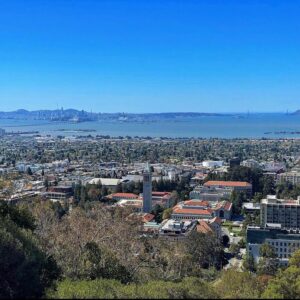
© Emna Aidi
Last Advice:
You will need at least half a year to plan such a research stay abroad. I created a one-page leaflet about my idea to work on my master’s thesis, listing my relevant coursework I took at the RWTH Aachen University and my interests in which I would like to work. I sent it to professors, who seemed to work on similar topics, and kept asking them to help me forward my email to others as well. Apply for scholarships since the research stay will be very expensive (Auslandsbafög, RWTH Research Ambassador, Promos DAAD, GIZ).
View: At the LBNL (located on a hill) overlooking the UC Berkeley campus and San Francisco with the Golden Gate Bridge.
My experiences in the Netherlands
- Biomedical Engineering M.Sc.
- Netherlands, Utrecht
- UMC Utrecht
- 01.06.2022 – 16.11.2022
Preparation:
To give myself some headroom to deal with the difficult housing market, I started looking for positions about nine months before the planned starting date. By the time I had found a position it was just four months to the starting date so that also had some implications on the available options in the housing market. A lot of general information pages about going abroad in the Netherlands recommend housing agencies like SSH to find student or some form of affordable housing. However, some of these agencies rely on a long waiting list, where it is more likely to get a housing offer the longer you are on the list. So, if you are running low on time, you can probably skip these options and look for alternatives, which saves you money in the process. This is another peculiarity of the Dutch housing market. While the German housing market is fairly accessible through online portals where you can see most of the available housing for free, the Dutch housing market is essentially locked behind a paywall, where most services require a subscription to contact any of the landlords. I found housing through the university hospital, which was by far the cheapest option compared to the private market. I was also required to make an appointment with the municipality for the registration purpose well in advance. I was able to get an appointment about four weeks away from the date I was looking on.
Commuting:
The Dutch system called OV-chipkaart makes commuting easy. It is essentially a prepaid (or bank account linked) public transport ticket which allows you to take every bus or train by simply checking in at the station or in the bus when you get on and checking out when you leave. It may be a little intimidating at first because you are always second guessing yourself if you have checked out correctly, but you can also register your chipkaart in the NS (Nederlandse Spoorwegen) App where you can check your latest chipcard activities. You can either order a personalized (bank account linked) card online, which takes about two weeks, or get a prepaid one at your local supermarket like Albert Heijn or Jumbo. I took the prepaid option which was still very comfortable because recharging stations are readily available at all train or bus stations and even some other locations like supermarkets. However, commuting by bus may become a noticeable financial burden because every trip you take has a flat base fee plus a per kilometre fee. Especially the base fee becomes very noticeable on short distances common inside the city.
With all of that said though, the obvious choice for commuting in the Netherlands is naturally the bike. Especially in Utrecht the bike infrastructure is exceptional. There are well maintained bike paths and bike storage everywhere which makes commuting by bike a treat. I took my bike from Aachen to Utrecht by train which is easy via the NS intercities.
Every-day life/internship:
Life in the Netherlands isn’t really all that different from life in Germany. Supermarket prices are a bit more expensive in some categories but are generally comparable to the ones you would fine here. This also applies to your average take out service, where a decent portion of fries will set you back about 3 € and a high-quality pizza is about 10 €. Payment services are also a non-issue in the Netherlands if you have a German debit card. There are very few places, if any, where you will encounter the need for cash because everything is paid by card, and I haven’t had any issues with my debit card (no extra fees or anything).
The Dutch working culture is also kind of similar but one thing I have encountered during my stay is that they put less emphasize on the lunch break. The lunch breaks were generally quite short (often just shy of 30 minutes) and primarily focused on food consumption. However, this may be attributed to the group I was working in. My internship was in the neuro engineering department of the Medical Centre Utrecht, which was a very international and highly goal oriented, so I spent a lot of time working.
Utrecht as a city also offers great recreational opportunities in forms of parks and proximity to farms around the campus. I regularly took strolls along the fields after work. If you take a bike, there are also a lot of historical landmarks within reach, including a lot of different forts and castles.
Conclusion:
While the housing situation and cost of living may be a little overwhelming in the beginning, the Dutch culture is very approachable and welcoming. The country offers a great experience in terms of travel, be it by bike or by public transport, which was a welcome change from the car centrist life in Germany. The university hospital in Utrecht is very well equipped and offers knowledge in a wide range of topics.
Go abroad. Go to Sweden.
- Business Administration and Engineering: Materials and Process Engineering B.Sc.
- Sweden, Helsingborg
- RKW Sweden AB
- April – October 2022
Ah, what a great summer…looking back now, it feels more like a big vacation than a semester of working. Maybe because I did so many great after- work activities, maybe because my internship itself was nice or maybe because now this time is over and it is winter in Germany. 🙂
I arrived in the middle of April and at first, things started off medium well. My room, rented by the company, was in the basement of a villa with quite a few alcoholics in the building. They were all nice to me, but this was something new and scary to me. Over time and with changing apartment mates it got better, but the first months were a bit hard because I did not feel at home there. Here we already have a few learnings about Sweden; first, almost nobody in Sweden rents apartments, so rental websites are a bit weird and mostly people in unstable points of their lives or students rent apartments. Also, Sweden has super strict laws and crazy prizes when it comes to alcohol, you are for example not allowed to drink alcohol on the street.
Let’s get to a more fun topic, work 😉 For me, working at a Swedish location of a German company was great. The atmosphere was good, the people were really nice and everyone spoke English well. Another great thing about Sweden is, how far it is in all terms of equality. If I was a woman or a man, the site management or the little intern, I felt like everyone was equally important and valuable. This is not the case in all companies or countries and so it was very interesting to have the many times stressed and not so relaxed German part of the company in comparison to the Swedish part I was working at.
If you want to experience a great working atmosphere, try working in Sweden. 🙂
One thing about the chill atmosphere, which almost irritated me, was the amount of Fika (coffee breaks) they take. Sometimes 45 minutes per day made me feel a bit unproductive, but many of my colleagues there were very comfortable with that. Another thing I had heard about before, is the swedes awkwardness when it comes to small talk. My own experience was, that if you have any connection to the person, small talk is fine and they will be really nice. They won’t go out of their way for you, like speak English during the entire lunch because you don’t speak Swedish, but someone will try to integrate you a bit. If they don’t know you at all, they will try not to talk to you at all, in public for example.
I did have a bit of problems in the beginning to get involved socially, but through my hobby sailing, some colleagues and Facebook, things slowly picked up. Facebook is actually one of my biggest recommendations for anyone going to Sweden. If you are trying to rent an apartment, inform yourself on clubs or social groups. If you want to find friends, look there. What works really well is hiking groups. I found that the people there are usually very open, come from everywhere and on top of that you are exploring the area. What happened to me is that one girl saw one of my hiking plans in one group, texted me and we became friends. We even made a trip to Stockholm together in the last weeks of my time in Sweden!
Now let’s come to my specific Skåne recommendations:

© Kuhlmann, Selma
-Kallbadhusets, beautiful saunas at the sea, where you can switch between bathing in the cold sea and sitting in the sauna. Very relaxing and not very expensive. (about the price for a cup of beer in Sweden;))
-Venn island in the middle of the Öresund, a beautiful place with fun yellow tandem bikes for exploring the nature.
-Kullaberg. An awesome hiking spot northern of Helsingborg.
-The bakery två systras in Helsingbog. They have a lot of awesome traditional Swedish Fikabröd like Kardemummabullar or Vaniljhjärta. My personal cake favorite: the Budapest.
-The Vasa museum in Stockholm. We were also a bit unsure of going because it does cost some money, but it was all worth it. Such an interesting and greatly made museum!
My conclusion: Go abroad. Go to Sweden. Start somewhere new. Learn more about yourself.
A great experience in Madrid
- Architecture M.A.
- Spain, Madrid
- b720 Fermín Vázquez Arquitectos
- May – October 2022
Living and working six months in the vibrant city of Madrid was a lot of fun for me. I did my obligatory internship in a rather small architecture studio in the northern central part of the city – close to the Bernabeu stadium. I shared a flat with two people in Hortaleza, which is in the north-east between the inner and outer ring, therefore a little bit far from the lively city centre. But it was within a good distance for the everyday commute and for an affordable price. One very important thing to know about living in Madrid is that the public transport system is working really well and if you live close to a metro or cercania station you can move very quickly within the city. If you are under 26 the monthly ticket is more than affordable.
My colleagues at the architecture studio were nice and welcoming. They offered me to speak in English but I asked them to only talk in Spanish with me as I wished to learn as much Spanish as possible during my stay. Even though I did not understand everything on my first days, it did not take long to get used to listening and speaking Spanish all day long. This way I learned a lot and could integrate well in the team. Nevertheless, I would highly recommend a good level of Spanish if you would like to do your internship in Spain.
I have spent the summer term in Madrid to enjoy the nice and hot climate. If I could choose again, I would probably prefer to do an internship of six month in the winter term for two reasons. First, in July and August, it got very hot. Maybe this year has been extreme, but we had a couple of weeks with temperatures above 35 degrees – up to 41 degrees on peak days. Even though every office is supposed to have air conditioning, mine did not because it was broken. As it took until the end of August until someone could fix it, we had to sweat quite a bit. Second, if your office does not make an obligated summer break you are probably to stay while everyone else is leaving Madrid for three or four weeks of vacation. And as people are taking turns, you can find yourself with only very few other co-workers in the office. When everyone came back from vacation, the social life outside the office started to pic up. Not only among the colleagues but also in the whole city. A lot of events happen in autumn in Madrid. So, when the time came that I had to leave, I really did not want to.
Madrid’s social life is inexhaustible. There are always things to do and always events happening. It is almost impossible to find a moment when the streets are empty. Concerning parties, it is probably impossible not to find a bar or club where you can listen to the music you like. You can find all kinds of parties in town. (Even though there is a lot of reggaeton, which was in my favour.) I enjoyed most going out in Cuenca and Malasaña – day and night. Also, even though the river of the city is rather small, Madrid has a lot of parks. I loved spending time at the Retiro Parque and Casa de Campo. But because I lived rather far away from these central parks I often went for a run to Parque Felipe VI. Probably no location where you would go to if you do not live close by, but I liked running there a lot because I had a view of Madrid’s Skyline as well as the mountains in the north of the city. If you search for a nice sunset location, I would not recommend Templo de Debot because it is always too crowded, but rather go to the Lookout at Tío Pío’s Hill.
Madrid is Europe’s highest capital city with about 600m above sea level. I noticed this the most due to the high temperature ranges between day and night. Therefore, it is always recommended to bring at least a light jacket. If you do not need it in the morning, maybe you will need it inside if the air conditioning is too cold.
The last thing that I would like to mention about Madrid is that I appreciated its geographic location within Spain a lot. It is very comfortable to travel from and to Madrid. The distances to all points of interest in all directions are more or less equal. If you book your AVE (the fastest trains in Spain) in advance, it is affordable and allows you to go – sometimes even non-stop – to either Sevilla or Barcelona within two hours. The bus takes about five to six hours depending on traffic conditions.
To put it in a nutshell, I can highly recommend Madrid (and for architects also my studio b720) as Erasmus+ location. I enjoyed the six month there a lot and I hope that I can go back soon. The people I met were wonderful and the food I ate delicious. I have learned a lot in language, professional and intercultural terms.
Building a metro tunnel under the city of Göteborg
- Business Administration and Engineering: Civil Engineering M.Sc.
- Göteborg, Sweden
- Wayss & Freytag Ingenieurbau AG
- 06.04.2022 – 07.10.2022
1. Application/Finding an internship
During the pandemic and especially the lockdown I decided that I want to do an internship abroad. A fellow student recommended me an internship with Wayss & Freytag Ingenieurbau AG in Göteborg, Sweden. Because I always wanted to explore the Scandinavian region, I knew that would be a great opportunity. After two video calls with the responsible site manager, I got the positive feedback to go there during the summer semester and directly applied for the Erasmus scholarship. For the internship I would recommend applying at least 3 months ahead. It is important that you apply for the Erasmus scholarship at least six weeks before the internship starts. For that scholarship you need to do an EU survey and an OLS language test. The most critical part is the Online Learning Agreement (OLA), where you need signatures from all parties involved.
2. Accommodation & Living expenses
The accommodation was provided by the company. It was a small but very well-equipped apartment in Frihamnen. Even though Frihamnen is on the northern site of the river, I liked the location because the city center is reachable within 10 min bike ride and the public transport is very good. The apartment complex is called ‘waterfront cabins’. They have long- and short-term renting. When visiters came from Germany, they could book them via Airbnb for an affordable price. Otherwise the living expenses are higher than back home. Especially living costs are from what I have heard quite high and for foreigners difficult to get. For renting an accommodation, Sweden is dividing into first and second hand contracts. As a foreigner you can only get second hand contracts, which basically means temporary sublease. The daily expenses are a bit higher, but obviously depends on where you go. For grocery stores I enjoyed going to Lidl. Not only for some German stuff, but also the price/performance is great. From my point of view going out is quite expensive. Clubs usually cost at least 200 SEK (= 20 €) entry fee. Also eating in restaurants or having some drinks in a bar is pricy. As a reference point: 0,4l beer costs in between 45-90 SEK. Again, it really depends on where you go.
3. Everyday life/ the internship
The German company Wayss & Freytag is building a metro tunnel under the city as part of the “West Link” (Västlänken) project in Göteborg. Västlänken is one of the biggest infrastructure projects in Scandinavia. During my internship I was stationed as a project engineer on the construction site in Liseberg. The tunnel line of this site is going to be around 300m long. One of the biggest difficulties is a river going through the construction pit, which makes a lot of heavy foundation works necessary. For that I was mainly supporting the site managers and sometimes the supervisors in the production. I was responsible for the short-term planning as well as different documentary and design tasks. The team I worked with was young and super friendly from the beginning. I got along with them very quickly and we started doing stuff after work and on the weekends immediately. That helped a lot to get along in a new country with a new language. Because the joint venture partner is a Swedish company (NCC), it was roughly 50% Swedish and 50% German speaking coworkers. That made the cultural exchange super interesting. I really enjoyed the work atmosphere with all the colleagues, even though the work attitude/ethic between German and Swedish people may differ. The company also organized afterworks or Friday-breakfasts on a regular basis. One highlight was the summer party. I think those events are helping a lot for team building purposes and gives you a different connection with your coworkers – besides it was very fun. 😉
4. Free time/tips
After work I usually did sports (paddle, running or boulder) with coworkers. During the warm summer months, we sometimes went for a swim in one of the beautiful lakes or the ocean. On the weekends I tried to explore the surroundings of Göteborg. Whether the archipelago near Göteborg or the stunning nature inland, there is so much to discover. Kayaking, hiking or go fishing were only a few activities. Some of my German colleagues started kite surfing or sailing. The opportunities of outdoor activities are just amazing. Göteborg as a city has everything you can imagine. There are clubs and bars, museums, parks and a lot of nice cafes. We often went to the street food market in Lindholmen for a ‘Fika’. If you are looking for a bar with affordable drinks, Tullen’s or Café Magazinete is recommendable. TaKeT is a rooftop bar with an amazing view over the river and one of my favorite places in a sunny afternoon. For weekend excursions, Göteborg is located in a triangle between Oslo, Copenhagen and Stockholm. All three destinations are reachable within 4 hours drive. There is a fast Flixtrain connection to Swedens capital. For Copenhagen and Oslo distance buses are recommended, as they are usually cheaper than train connections. One of the biggest highlights was spending traditional Midsummer in a Swedish summer house. The amount of daylight in the summer was an excellent experience.
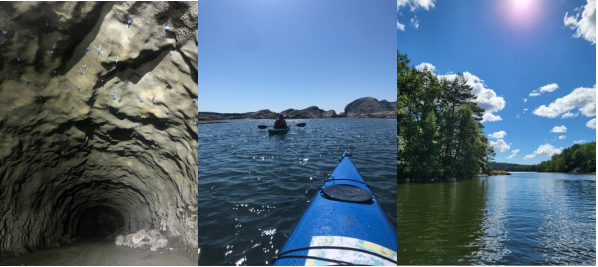
© Johannes Bennewitz
5. Conclusion
In summary, I can say that I absolutely benefited from the internship in many ways. Not only to getting to know the Scandinavian culture and the way of how a big infrastructure project works, but I also made a lot of new friends. For me personally I loved Göteborg as well as the Swedish nature and I will certainly be going there many more times in the future. I can highly recommend the internship program at Wayss & Freytag and I’m proud to be part of the Västlänken project.
Copenhagen – A city full of life
- Architecture M.Sc.
- Copenhagen, Denmark
- Sweco Architects
- 28.03.2022 – 30.09.2022
While studying architecture, we have to do an internship before writing our master thesis. I chose to complete mine in Copenhagen. I totally fell in love with the city. Especially during the summer month, its just amazing. The weather was mostly good, not too warm and when the sun shines, the people and the city unfold so much life, lightness and openness. You can see how precious the sun and the light is, as soon as it´s sunny, life happens outside, by the water, in parks, cafés… The city has the perfect size, it´s big enough to fill 6 months with new experience, and I still haven’t seen everything, but you also cannot get lost. There are always familiar corners and sometimes it´s like a little village.
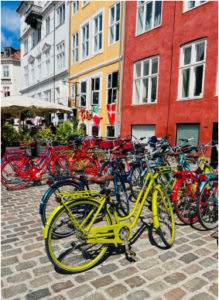
© Amelie Weber
The Danes are sometimes a bit closed, and you have to warm their heart before they let you in, but in general they are always friendly and up to help you. They will be confused if you smile at them without a reason, but it’s a challenge to win them as your friend, and you will succeed. I met so many amazing people, I don’t want to miss in my life anymore. The city is also filled up with internationals from all over the world, you will for sure find a big community from your home country, if you feel like surrounding yourself with people from home. But I recommend mixing it up, Danes, people from your home country, other internationals. That´s what made it very interesting and also informative for me. That’s also a good way for your English to improve enormously. Danes speak English very well, no matter how old they are. It´s very easy to survive with only speaking English and no one will expect you to change that or look at you in a weird way, if you don’t speak Danish.
Denmark, especially Copenhagen, is super expensive. You cannot survive with the Erasmus money only, it needs to be combined with a salary, and in my case my parents also send me money, since the company didn’t pay me that well. In those 6 month I´ve spend around 11.000 euros while having a normal amount of free time activities. Going to a bar and paying 55 DKK (7,40 euros) is normal.
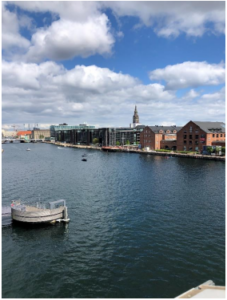
© Amelie Weber
I rented a Swapfiets during my stay and that was perfect. Public transportation works very well in Denmark, but is also expensive. Everything that can be reached by bike in 30 min, is done by bike. The bike lanes are a dream and on your way to work you will probably meet your boss on a cargo bike with some kids in it.
I would recommend to start the search for an apartment in time. The market is super fast. I didn’t have any success with Facebook groups, but can recommend “findroommate” or “BoligPortal”. You will have to pay a fee to use those portals, but for me, it was worth the money because I found the most amazing room and roommate.
If you stay longer the 3 month and earn money, you will have to register for EU registration and CPR number. Do it as fast as possible, the waiting time is pretty long. You will need it, to open a bank account and to get access to the Danish health system. As a bank I recommend Lunar, the waiting time was 2 weeks and everything is online and English. The waiting time for one of the big Danish banks is usually around 6-7 weeks.
For me, those 6 month were the most amazing month of my life and fell in love with the city. I hope everyone else, who is choosing Copenhagen, has the same experience. I can recommend the city very much and the Erasmus money will help a lot. I am very grateful I got the chance to have that money. Last but not least: Enjoy the time!
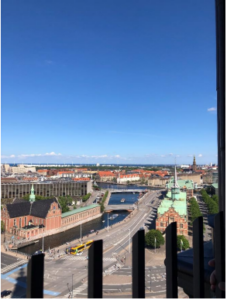
© Amelie Weber
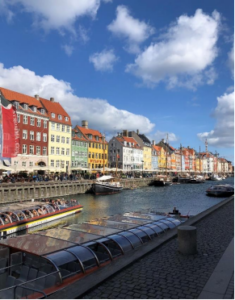
© Amelie Weber
Toledo- an old city with a lot of Spanish flair
- Biology M.Sc.
- Spain, Toledo
- Hospital Nacional de Paraplejicos
- 04.05.2022-30.09.2022
My name is Anna, and I have been studying at the “Hospital Nacional de Paraplejicos” in Toledo from May to October 2022. I study Biology in my Masters. In the following, I will try to share knowledge with you that will help you to make the best out of your stay.
The preparation for my internship focused on transport, insurance, and housing. For my research internship abroad, I travelled to Toledo by plane. I arrived at the airport in Madrid and travelled from there to Toledo by train. If you do not want to go by plane, you can also go by railway. This takes a little bit longer, but you can combine your travel with some stopovers in other beautiful cities. Further you save some CO2 and secure the additional Erasmus funding for a green travel back home.
The health insurance is very simple. If you didn’t already have one included, you can ask your insurance to provide you with a European health insurance card. Keep in mind that most insurances do not cover rescue or repatriation in case something goes wrong on a hiking trip for example. You should ask your insurance about that.
I started to look for a flat or a room in Toledo approx. one month in advance. I made some visiting appointments for the first few days. During this time, I was living in a guest room in the professor’s house. The apartment search turned out to be very difficult. I tried to find a flat with the website “Idealista”. Many accounts didn’t even answer or other flats where small or dubious. Also, the language barrier was a big problem, due to the reason that the most landlords did not speak English. I would recommend all students doing an internship in Spain, to practice some Spanish before your internship abroad. Without the help of my work mates most of the viewing appointments were not able. Further I would recommend structuring your profile on those websites so personal as possible. If you apply for an apartment, you should always bring some personal stuff inside the texts and maybe take up some points of their advertisement.
After visiting some flats without any success, one of my workmates had the idea to look for a room in a student’s residence. I found a place in the “Residence María Immaculada Toledo”. Here I lived in a single room in the casco of Toledo. The rent for one month was 520 euros including breakfast, lunch, and dinner. This room was only available for 1 month, so I had to look for another flat in the meantime. Happily, I found my perfect flat quickly. It was a shared flat with three other Spanish girls in the age between 25-30. All three of them were as well working in the hospital. The flat was just perfect, with a large living room, a large kitchen, and a swimming pool. It was also near to the hospital, so I could walk every day by foot to the work. The rent here was 250 euros excluding extra costs like water and light.
My first impression of Toledo was impressive. It is an old city with a lot of Spanish flair. Exactly what I had expected from Spain. I applied for a position in the “Hospital nacional de paraplejicos”, to do my practical course of my master thesis there. The hospital and the investigation have their focus on spinal cord injuries. The hospital is very new and modern, and my work collogues were helpful and nice from the first moment on. I really enjoyed the work in the hospital. The willing to help was so large from all my work mates, and they integrated me into their team very quickly. I learned a lot of new techniques important for my further working live. I was working on my own project. Although the working language in the laboratory was English, it turned out to be a little bit tricky to communicate. The English knowledge of most of my collogues was rather bad. On the other hand, my Spanish knowledge was not the best. So I decided to learn a lot of Spanish int the next few weeks. The understanding was getting better from day to day. As well in English, but also in Spanish. Quickly I was able to follow conversations in Spanish and to talk some basic sentences.
With the girls of my flat I made friends quickly. They took me on hiking tours, we all signed in for the gym and they told me how to play padel tennis, a very popular sport in Spain. On the weekends we normally went out together and they introduced me to their friends. They took me to cultural events in Toledo and told me which places are worth to visit. Another positive point is the close distance to Madrid. It is only 30 minutes by train, so you can also explore the capital of Spain on the weekends.
Going to Toledo was one of the best decisions of my life. The “Hospital nacional de paraplejicos” is a great hospital with nice work mates and a great investigation department. On top, Toledo is a nice, typical Spanish city with endless opportunities and a close distance to Madrid. I hope that my short report gave you some insights into these opportunities.
My practical year in France
- Staatsexamen, Medizin
- Rouen, France
- Hôpital Charles-Nicolle de Rouen
- May 2022 – September 2022
Preparation
The preparation began about a year before I started my Practical year (Praktisches Jahr- PJ). For the registration and application, I contacted Ms. Watteel directly, who is responsible for Erasmus stays at Université de Rouen Normandie. She was my contact person during the entire Erasmus stay and took care of all formal requirements and certificates in a timely manner.
Housing
Accommodation can be found at leboncoin.fr (something like Ebay in Germany) or Facebook. There is also the possibility to apply for student residences, but I did not do this. Furthermore, there are many real estate companies in Rouen that rent both furnished and unfurnished apartments. It should be noted that if the apartment is rented through a company, a fee of approximately one month’s rent must be paid. For students, the right side of the city is warmly recommended, because most of the activities and parties are on this side of the city. There are good bus connections to other parts of the city, but they are very limited at night. The university hospital is located almost in the city center and is easily accessible by public transportation.
Job and everyday life
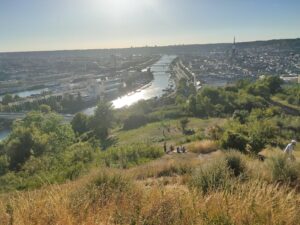
© Lara Gubeljak
I completed a PJ tertial in the clinic for general surgery (chirurgie digestive). There I was in the OR every day and was allowed to assist most of the time, be it directly on the patient or administering the instruments. There were many opportunities for me to actively participate. I found it very good that I was allowed to sew up, that I could participate in organ donations, and that I was also able to perform some tasks beyond the student tasks. A normal day started at 7:30 a.m. and ended between 4:00 p.m. and 6:30 p.m. The visceral surgery team was very nice and had a lot of patience, especially when I occasionally didn’t understand things because of the language barrier. There were some doctors who also explained things in English, although this is not the rule in France.
For the internship, you get a reimbursement of about 250€ per month, but you must check with the HR department often and have a French bank account. All students who are currently doing their internship in a surgical department share the 24 hour duties among themselves. These services are additionally paid but are not obligatory for exchange students. During the night duty you have to do instrumentation and assist in the OR. You get your own room with your own DECT phone. If you are lucky and there are no emergencies, you may (and should!) sleep.
Leisure
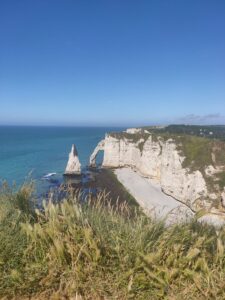
© Lara Gubeljak
I was very fortunate to have a large circle of friends in Rouen, which made the stay overall very social and gave a different perspective to the busy PJ. It is very common to end the evening in a bar or café, although it must be said that due to the early working hours this was often not possible. Rouen is a student city and there is always something going on. In summer there are concerts every Thursday, there is the daily Cathederal de Lumiere, which was exciting every time again. It is a beautiful city from the Middle Ages, so there is a lot of history to see. The numerous museums are free until the age of 26. The surrounding cities like Paris, Le Havre, Étretat or Vernon are very worth seeing and easy to reach by train.
Conclusion
Rouen should and can definitely be recommended for tourism as well as for the PJ. I learned a lot there, was able to do a lot of practical work and strengthened many social skills in the professional setting. The beginning of the PJ was very exhausting, because a lot of things happened very quickly in the hospital and the medical terminology is clearly different, plus it contains many abbreviations. It was a great opportunity to deepen my French and to get an insight into general surgery. Four months were enough to settle in well and to get a little insight into the rest of Normandy.

